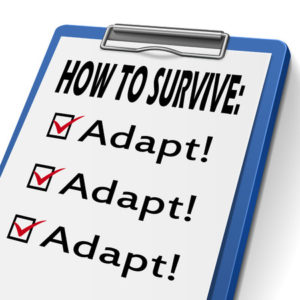
You don’t have to go far to learn about some of the challenges people are facing in their businesses and organizations. You just have to turn on the news or look around you. There appears to be a great strain on society today being so busy that they are unable to find equilibrium. People are asked to do more with less. People look busy running from one activity to the next but are they productive? Are they meeting their deadlines or quotas?
 The one constant in everyone’s life is change. We are all faced with changes and challenges on a day-to-day basis. One of the greatest challenges that leaders within organizations face is being able to keep up with their workloads while putting out fires that seem to arise. They are taken away from some of their critical work to focus intently on performance issues. Managing people and working with people can sometimes be draining especially when you’re faced with resistance and lack of awareness. Sometimes it feels like no matter how much effort you put into something that you are unable to achieve what you hope to. At times this can be disheartening for a leader to lead because they may lose sight of their focus and the meaning of the work that they were driven to do. Don’t give in and don’t give up! Adapt!
The one constant in everyone’s life is change. We are all faced with changes and challenges on a day-to-day basis. One of the greatest challenges that leaders within organizations face is being able to keep up with their workloads while putting out fires that seem to arise. They are taken away from some of their critical work to focus intently on performance issues. Managing people and working with people can sometimes be draining especially when you’re faced with resistance and lack of awareness. Sometimes it feels like no matter how much effort you put into something that you are unable to achieve what you hope to. At times this can be disheartening for a leader to lead because they may lose sight of their focus and the meaning of the work that they were driven to do. Don’t give in and don’t give up! Adapt!
“Life doesn’t get easier or more forgiving, we get stronger and more resilient.”
― Steve Maraboli, Life, the Truth, and Being Free
Effective leaders become resilient through self-reflection and an increased self-awareness. Not only are the intellectual but they are emotionally intelligent. Resilience is the characteristic of being able to bounce back in the face of loss or failure. A resilient leader does not play victim to their circumstance. They shift into the mindset of a learner and so can you.
Everything is not in your control so don’t take things personally. Sometimes things in life occur that we do not expect and planning and preparation could not prevent them from occurring. Know that many things occur that are not in your control and it’s not your fault. You can only take ownership of things that you can do something about.
Resilient leaders know that it’s important to continue developing personally and professionally in order to embrace change and challenges. When people face a crisis or cutbacks, one of the first areas that seem to be eliminated is that of personal and professional development. This is a grave mistake as when people are learning and growing they are inspired and can cultivate new ideas and solutions to the challenges that they face. Never stop learning!
A resilient leader knows that it’s imperative to celebrate success even in the midst of a challenge. There is an opportunity to learn from success just as much as failure. Examine steps, processes, and strategies that help you develop success; they can be your greatest tools in helping you navigate some of your roadblocks.
Many of the greatest leaders have demonstrated that it’s important to take the time to recharge and rejuvenate in order to become a resilient leader in bounce back from trying situations. Meditation, prayer, and journaling are just some of the rituals that some of these leaders use to gain clarity on some of the significant situations that they face and eliminate the distractions from seeing clearly. Other leaders enjoy going for a walk in nature or a run to clear their mind.
Resilient leaders know that it is important to focus on the type of climate they want to create. They imagine the possibilities and articulate a new vision for the future. They pay attention to the words they use and ensure that they are creating a positive future – a future that taps into the strengths of the people who follow them. They know that open communication is the key to leading the way.
An effective leader knows that they do not have all the answers to every situation that they have the ability to tap into the strengths, opinions, and best experiences of their people. They draw on these perspectives and engage their people in coming up with new ideas in helping provide a solution to the challenges they face. By engaging their people, they know that the people will be intrinsically motivated to move toward a shared vision.
The resilient leader is someone who has been able to develop the skill of managing their own emotions and recover quickly. There are many characteristics and styles of leadership; however, emotional intelligence is a skill that is a must in building resilience.
“Shift your attention, and your emotion shifts. Shift your emotion, and your attention shifts.”
― Frederick Dodson
Optimism helps effective leaders maintain focus on their vision even when faced with setbacks. They choose to look for “what is good or right” about a situation. They know that wherever your intention goes your attention follows. They look on the bright side of every situation looking for the opportunity to learn and grow so that they may become more effective.
 Leaders know that it’s important to build and nurture a network of relationships before you need them. When you are in crisis or faced with the challenge, you need to have that support immediately and if you don’t have it is more challenging to get through the tough times. When you build relationships, people are quick to reciprocate and support each other lessening the challenges.
Leaders know that it’s important to build and nurture a network of relationships before you need them. When you are in crisis or faced with the challenge, you need to have that support immediately and if you don’t have it is more challenging to get through the tough times. When you build relationships, people are quick to reciprocate and support each other lessening the challenges.
Bouncing back to become the leader you want to be involves remembering your “WHY”. Why do you do the work that you do? Rediscover and connect with what she once was passionate about. See the importance in the work that you do. Your efforts do not go unnoticed although at the time it sometimes feels like it. Know that you are making an impact in this world even if you don’t receive immediate feedback. There will be a tipping point in which your efforts will have compounded and made the biggest difference. Bounce back and be strong – people are looking for a leader like you.
DEBRA KASOWSKI, BScN CEC is an award-winning best-selling author, transformational speaker, blogger, and Certified Executive Coach. She has a heart of a teacher and is certified in Appreciative Inquiry and Emotional Intelligence. Her writing has been published in a variety of print and online magazines. Debra Kasowski International helps executives, entrepreneurs, and organizations boost their productivity, performance, and profits. It all starts with people and passion. Sign up the Success Secrets Newsletter and get your free mp3 download today! www.debrakasowski.com



